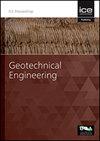Dry stacking of iron ore tailings: Possible particle breakage during compaction
IF 1.7
4区 工程技术
Q3 ENGINEERING, GEOLOGICAL
Proceedings of the Institution of Civil Engineers-Geotechnical Engineering
Pub Date : 2023-07-13
DOI:10.1680/jgeen.22.00216
引用次数: 0
Abstract
The disposal of iron ore tailings in dry stacks has become increasingly common in Brazil. In these structures, the iron ore tailings are compacted in layers using drum rollers that cause compaction and vibration efforts on the ground. Particle breakage is usually observed in granular materials when subjected to static loads of great magnitude, as can occur depending on the stacking height achieved. However, particle breakage also may occur during the layers’ compaction. This study investigates the breakage behaviour of iron ore tailings simulating load conditions that may occur during dry stacks construction. Two usual iron ore tailings with different amounts of clay size particles, but similar mineralogy (about 77% quartz and 19% iron oxide – the usual composition of iron ore tailings in Brazil) were subject to cyclic oedometer tests. Particle size distribution analyses were performed before and after testing all specimens. Both iron ore tailings, representing typical physical and mineralogical characteristics of the Quadrilátero Ferrífero (southeast Brazil), only suffered particle breakage (Relative Breakage between 0.12 and 0.14 for tailings A and between 0.14 and 0.16 for tailings B) under extremely high pressures (σ’v = 85 MPa) applied by oedometer testing, above those usually found in the field. For usual pressures applied in the field, the frequency of load and number of cycles were of no significance in particle breakage.铁矿尾矿干堆:压实过程中可能出现的颗粒破碎
在巴西,用干堆处理铁矿尾矿已变得越来越普遍。在这些结构中,铁矿尾矿使用滚筒式压路机分层压实,在地面上产生压实和振动作用。颗粒破碎通常在颗粒状材料中观察到,当受到巨大的静态载荷时,可能发生取决于所达到的堆叠高度。然而,在层压实过程中也可能发生颗粒破碎。本文模拟干堆施工过程中可能出现的荷载条件,对铁矿尾矿的破坏行为进行了研究。两种通常的铁矿尾矿具有不同数量的粘土大小颗粒,但矿物学相似(约77%的石英和19%的氧化铁——巴西铁矿尾矿的通常成分),进行了循环测径仪测试。在测试前后对所有样品进行粒度分布分析。这两种铁矿尾矿均具有巴西东南部Quadrilátero Ferrífero铁矿的典型物理矿物学特征,在测径仪试验施加的极高压力(σ′v = 85 MPa)下,仅发生颗粒破碎(A尾矿的相对破碎率在0.12 ~ 0.14之间,B尾矿的相对破碎率在0.14 ~ 0.16之间),高于现场常见的颗粒破碎率。对于现场施加的通常压力,载荷频率和循环次数对颗粒破碎没有显著影响。
本文章由计算机程序翻译,如有差异,请以英文原文为准。
求助全文
约1分钟内获得全文
求助全文
来源期刊
CiteScore
4.40
自引率
4.50%
发文量
68
审稿时长
3 months
期刊介绍:
Geotechnical Engineering provides a forum for the publication of high quality, topical and relevant technical papers covering all aspects of geotechnical research, design, construction and performance. The journal aims to be of interest to those civil, structural or geotechnical engineering practitioners wishing to develop a greater understanding of the influence of geotechnics on the built environment.

 求助内容:
求助内容: 应助结果提醒方式:
应助结果提醒方式:


